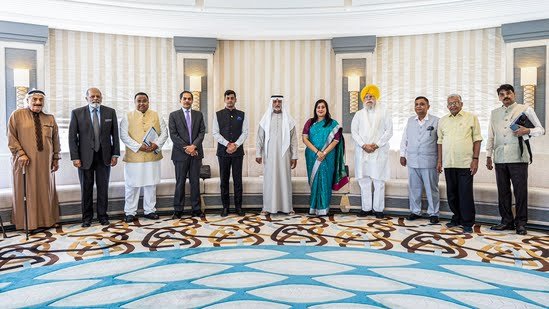Washington D.C. – During a recent White House meeting with South African President Cyril Ramaphosa, President Donald Trump once again claimed his pivotal role in resolving the recent ceasefire between India and Pakistan. Trump asserted that he “settled” the tense conflict, which flared up following India’s “Operation Sindoor,” suggesting trade relations were the key.
The discussion was held on Wednesday, May 21, 2025, in the Oval Office, saw President Trump reflecting on the swift de-escalation between the two South Asian nuclear powers. “If you take a look at what we just did with Pakistan and India. We settled that whole, and I think I settled it through trade,” Trump stated. He elaborated that the U.S. was actively pursuing significant trade agreements with both nations, which, he implied, influenced the resolution.
Escalation and Resolution: A Brief Overview
The recent confrontation between India and Pakistan stemmed from the April 22 Pahalgam terror attack in Jammu and Kashmir, which tragically claimed 26 lives. In response, India launched Operation Sindoor on May 7, conducting precision strikes on terror infrastructure across Pakistan and Pakistan-occupied Kashmir (PoK). Indian forces reported eliminating over 100 terrorists affiliated with major groups like Jaish-e-Mohammed, Lashkar-e-Taiba, and Hizbul Mujahideen.
Pakistan retaliated with attempted strikes on Indian military installations on May 8, 9, and 10, leading to strong counter-attacks from the Indian military. The intense four-day period, marked by drone and missile exchanges, concluded with a ceasefire on May 10, 2025. On the same day, Trump had previously declared that both nations had agreed to a “full and immediate” ceasefire after “long night” of talks, which he suggested were mediated by Washington.
India’s Stance on Mediation

Despite Trump’s repeated claims of mediation, the Indian government has consistently maintained that any issues concerning Jammu and Kashmir must be addressed bilaterally between India and Pakistan. Official statements from New Delhi have underscored that the ceasefire understanding was a direct result of bilateral discussions between the Directors General of Military Operations (DGsMO) of both countries, effectively refuting any suggestions of third-party involvement. External Affairs Ministry spokesperson Randhir Jaiswal has reiterated India’s long-standing position of resisting external mediation on the Kashmir issue.
During his meeting with President Ramaphosa, Trump also expressed his admiration for the leadership of both nations. “Pakistan has got some excellent people and some really good, great leader. And India is my friend, Modi,” he remarked, to which Ramaphosa reportedly replied, “Modi, mutual friend.” Trump concluded, “He’s a great guy and I called them both. It’s something good.”
The enduring claims by President Donald Trump regarding his role in the India-Pakistan ceasefire continue to generate discussion, even as India maintains its firm stance on bilateral resolution for regional disputes.
In the intricate dance of international diplomacy, the recent exchange between President Donald Trump and South African President Cyril Ramaphosa once again brought the complex dynamics of India-Pakistan relations to the forefront. Trump’s consistent assertion of having “settled” the ceasefire, particularly through the leverage of trade, paints a specific picture of U.S. influence in South Asian geopolitics. This narrative, however, stands in stark contrast to New Delhi’s firmly reiterated position that any resolution, including the crucial ceasefire that followed Operation Sindoor and the retaliatory strikes, was a result of purely bilateral discussions between the Director Generals of Military Operations.
This divergence in perspectives highlights the nuanced reality of peace-building efforts in a volatile region. While external encouragement for de-escalation is often welcomed, India’s long-standing principle against third-party mediation in issues concerning Jammu and Kashmir remains unshakeable. The events surrounding the Pahalgam terror attack, India’s swift response through Operation Sindoor targeting terror infrastructure, and Pakistan’s subsequent retaliation underscore the inherent sensitivities and security imperatives driving policy decisions in both nations.
Ultimately, the future of India-Pakistan relations continues to hinge on direct engagement and a mutual commitment to peace, rather than external interventions. While international leaders like President Trump may offer their interpretations of events, the foundation for lasting stability will be built upon the direct communication channels and diplomatic efforts between New Delhi and Islamabad. As global attention remains fixed on these critical regional dynamics, the emphasis on bilateral dialogue as the primary pathway to resolving disputes will undoubtedly remain a cornerstone of India’s foreign policy, navigating the complexities of regional security and fostering a pathway towards enduring peace in the subcontinent.